In PowerPoint, you can apply multiple animation effects to a single string of text or an object, such as a picture, shape, or SmartArt graphic.
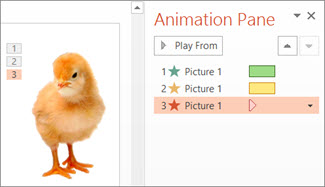
Tip: When working with multiple animation effects, it helps to work in the Animation Pane, where you can see a list of all the animation effects for the current slide.
Add another animation effect to an object
-
Select the object on the slide that you want to animate.
-
On the Animations tab, select Animation Pane.
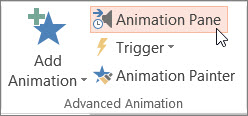
-
Select Add Animation, and pick an animation effect.
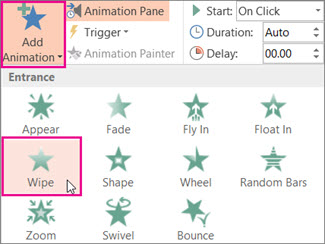
-
To apply additional animation effects to the same object, select it, click Add Animation and pick another animation effect.
Important: After applying the first animation effect, if you try to add more animation effects any other way other than clicking Add Animation, you won’t apply an additional effect. Instead, you’ll replace the existing effect with a the one you’re adding.
Set the start time and length of an animation effect
When you want to control the timing of your animation effects, do the following for each animation effect:
-
In the Animation Pane, select the down arrow next to the animation effect, and then select Timing.
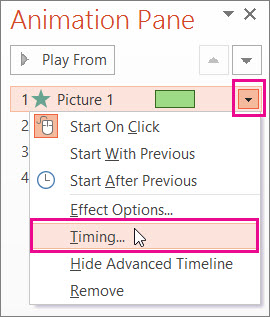
-
On the Timing tab, select the Start down arrow, and choose from the following start times:
-
To have the effect play when the mouse is clicked, select On Click.
-
To have the effect play at the same time as the previous animation effect, select With Previous.
-
To have the effect play after the previous animation effect plays, select After Previous.
Tip: The previous animation effect is the one listed in the playing order in the Animation Pane (usually located just above the animation you are setting the timing for).
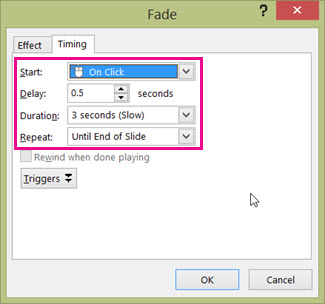
-
-
To delay the animation effect from starting, click the Delay up arrow to the number of seconds you want.
-
To change the speed of the animation effect, set the Duration to the level you want.
-
To watch how the animation effects work together, click Preview on the Animation tab.
Play multiple animation effects at the same time
You can have two or more animation effects occur at the same time for one object. For example, a picture could fade in and float in. To accomplish this layering of two (or more) effects at once, do as follows:
-
Use Add Animation to add the second effect.

-
For the timing of the second effect, set Start to With Previous.
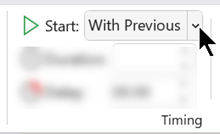
Tip for working with multiple animation effects
When you work with multiple objects on a slide, it can be difficult to differentiate one object and its applied animation effects from another.
In the picture, below, the default object names don’t provide much of a description so it’s hard to tell which object has what animation effect applied to it.
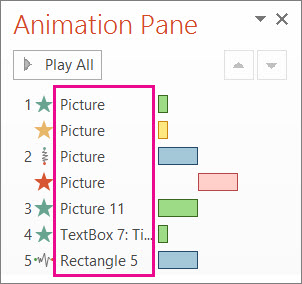
In the Selection Pane, you can give each object a distinct name to make it easier to work with them when you are applying animations to each. See below:
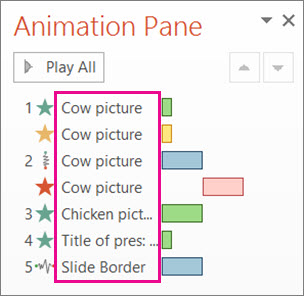
-
To change the name of an object, on the Home tab, choose Select > Selection Pane.
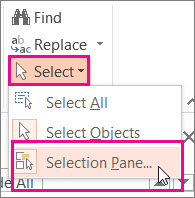
-
In the Selection pane, double-click the default object name to open the box, then type a new name for the object.
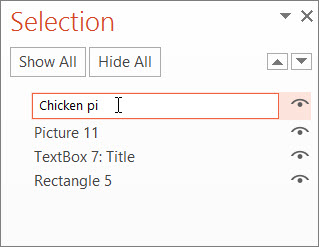
More about working with animation effects
Tip: When working with multiple animation effects, it helps to work in the Animation Pane, where you can see a list of all the animation effects for the current slide.
Add another animation effect to an object
-
Select the object on the slide that you want to animate.
-
On the Animations tab, click Animation Pane.

-
Click Add Animation, and pick an animation effect.

-
To apply additional animation effects to the same object, select it, click Add Animation and pick another animation effect.
Important: After applying the first animation effect, if you try to add more animation effects any other way other than clicking Add Animation, you won’t apply an additional effect. Instead, you’ll replace the existing effect with a the one you’re adding.
Set the start time and length of an animation effect
When you want to control the timing of your animation effects, do the following for each animation effect:
-
In the Animation Pane, select the effect you want to edit.
-
Select Timing.
-
Under Timing, select the list next to Start, and choose from the following options:
-
To have the effect play when the mouse is clicked, select On Click.
-
To have the effect play at the same time as the previous animation effect, select With Previous.
-
To have the effect play after the previous animation effect plays, select After Previous.
Tip: The previous animation effect is the one listed in the playing order in the Animation Pane (usually located just above the animation you are setting the timing for).
-
-
To delay the animation effect from starting, click the Delay up arrow to the number of seconds you want.
-
To change the speed of the animation effect, set the Duration to the level you want.
-
To watch how the animation effects work together, click Preview on the Animation tab.
Play multiple animation effects at the same time
You can have two or more animation effects occur at the same time for one object. For example, a picture could fade in and float in. To accomplish this layering of two (or more) effects at once, do as follows:
-
Use Add Animation to add the second effect.

-
For the timing of the second effect, set Start to With Previous.

More about working with animation effects
Add another animation effect to an object
-
On the Animations tab, select Animation Pane.
-
Select the object you want to add an effect to.
-
At the top of the Animation pane, select Add.
The new effect is added to the end of the list of effects. It is named for the object. PowerPoint automatically assigns it a default effect, such as Fade.
-
Select the new effect to open it. Then select the animation effect you want to assign to it, and adjust the Start, Duration, and Delay, as needed.
Set the start time and length of an animation effect
-
In the Animation pane, select the object whose timing you want to set.
-
Select the list next to Start, then choose the option you want:
-
To have the effect play when the mouse is clicked, select On Click.
-
To have the effect play at the same time as the previous animation effect, select With Previous.
Tip: The previous animation effect is the one listed in the playing order in the Animation Pane (usually located just above the animation you are setting the timing for).
-
To have the effect play after the previous animation effect plays, select After Previous.
-
-
To delay the animation effect from starting, select Delay and enter the number of seconds you want the delay to be (in increments of .25 seconds).
-
To change the speed of the animation effect, set the Duration to the length of time (in seconds) you want.
Play multiple animation effects at the same time
-
In the Animation pane, use Add to add the second effect, as described above under "Add another animation effect to an object."
-
For the timing of the second effect, set Start to With Previous.










